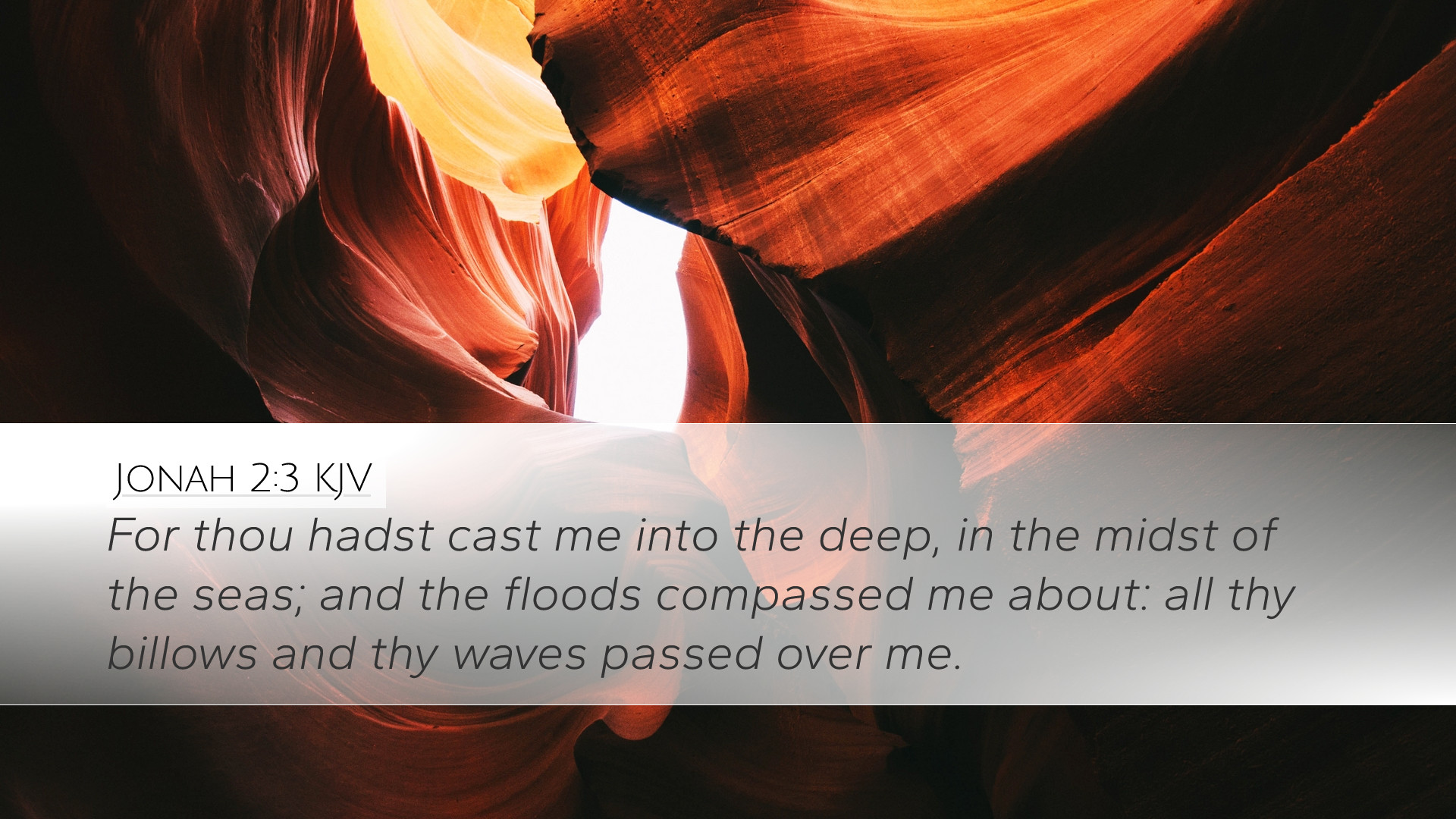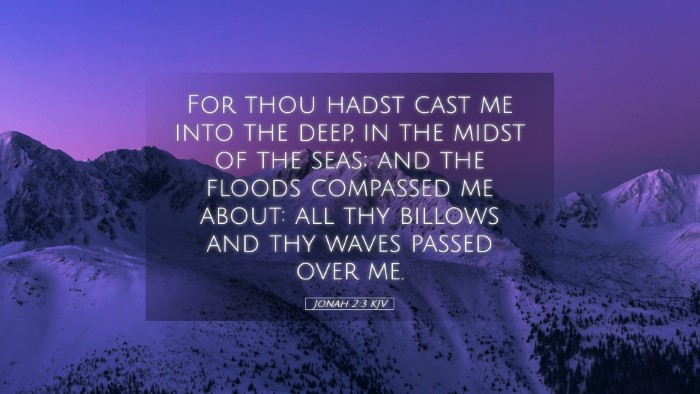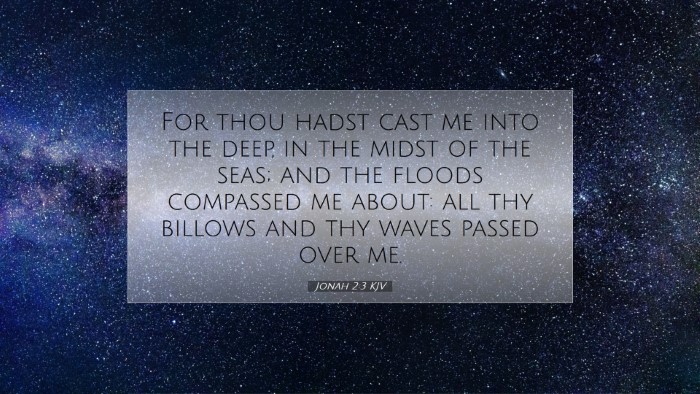Old Testament
Genesis Exodus Leviticus Numbers Deuteronomy Joshua Judges Ruth 1 Samuel 2 Samuel 1 Kings 2 Kings 1 Chronicles 2 Chronicles Ezra Nehemiah Esther Job Psalms Proverbs Ecclesiastes Song of Solomon Isaiah Jeremiah Lamentations Ezekiel Daniel Hosea Joel Amos Obadiah Jonah Micah Nahum Habakkuk Zephaniah Haggai Zechariah MalachiJonah 2:3
Jonah 2:3 KJV
For thou hadst cast me into the deep, in the midst of the seas; and the floods compassed me about: all thy billows and thy waves passed over me.
Jonah 2:3 Bible Commentary
Commentary on Jonah 2:3
In Jonah 2:3, we are presented with a poignant moment in Jonah's journey, encapsulating his despair and reliance on divine mercy. The verse states:
"For you cast me into the deep, into the heart of the seas, and the flood surrounded me; all your waves and billows passed over me."
1. Contextual Understanding
This verse occurs in the midst of Jonah's prayer while he is in the belly of the great fish. Understanding the historical and literary context of Jonah is essential for deeper insights into this verse. Jonah, a prophet of God, initially disobeyed God’s command to go to Nineveh, leading to his fateful journey across the sea.
- Disobedience and Consequence: Jonah's disobedience resulted in God sending a storm, ultimately leading to him being thrown into the sea.
- Symbolism of Depth: The sea is often a symbol of chaos and judgment in the Hebrew Scriptures, representing both physical peril and spiritual crisis.
2. Detailed Analysis from Commentaries
Matthew Henry's Commentary
Henry emphasizes the theme of God’s sovereignty in Jonah's plight. He notes that while Jonah feels overwhelmed by the waters, it is God who ultimately orchestrates the circumstances for Jonah's redemption.
- Divine Discipline: Henry points out that God’s actions, including sending the fish, are acts of divine discipline meant to bring Jonah to repentance.
- Expression of Guilt: The casting into the deep signifies both Jonah’s guilt and his acknowledgment of it; he recognizes his own role in his suffering.
Albert Barnes' Notes on the Bible
Barnes provides a thorough examination of the language and metaphorical implications in the verse. He notes that "the deep" refers not only to the physical depths but also to a spiritual state of despair.
- Imagery of Waves: The waves and billows represent the overwhelming nature of Jonah’s circumstances, enhancing the sense of isolation he feels.
- God’s Presence in Trial: Barnes suggests that even in despair, Jonah recognizes God’s hand in his ordeal, demonstrating an underlying faith amidst turmoil.
Adam Clarke's Commentary
Clarke elaborates on the poetic nature of Jonah’s prayer, emphasizing the vivid imagery and emotional weight of the text.
- Literary Excellence: He highlights the use of parallelism and metaphors that enrich the reading, making it both a personal lament and a theological reflection on divine justice.
- Symbol of Resurrection: Clarke draws parallels between Jonah's experience and the themes of death and resurrection, suggesting that his time in the fish symbolizes a transformative phase in Jonah's spiritual journey.
3. Theological Implications
This verse serves as a critical juncture for understanding not only Jonah's character but also broader theological themes:
- Repentance: Jonah’s trajectory highlights the necessity of repentance; he must confront his actions before moving forward.
- God’s Mercy: Despite Jonah's initial rebellion, God’s mercy is palpable, as He does not abandon him to the depths.
- Human Experience of Despair: This verse resonates with the human experience of feeling lost or abandoned, speaking to the universal need for hope and salvation.
4. Application for Pastors and Theologians
Jonah 2:3 invites both reflection and action for those who preach and teach the Scriptures:
- Encouragement in Trials: Pastors can use this verse to remind congregants that God is present even in deep trials.
- Preaching on Repentance: This passage provides a foundation for discussing the ways and the necessity of returning to God after straying.
- Connecting with Human Emotion: Engaging the emotional content of Jonah's prayer can foster deeper connections with those undergoing their adversities.
5. Conclusion
In examining Jonah 2:3 through the lens of historical context, literary devices, and theological significance, we find a rich tapestry of meaning that speaks to the heart of human experience. The interplay of divine sovereignty, human struggle, and the theme of redemption encapsulates the essence of the Gospel narrative, inviting readers to explore their own responses to God’s call, even amidst life's tempests.


